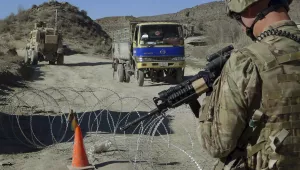The United States, India, and the Challenge of Afghanistan
Executive Summary
In less than two years, the United States and NATO will draw down their presence in Afghanistan and complete a transition to Afghan security forces. Violence and instability, already prevalent, are likely to persist and worsen – with grave consequences for American interests in the region.
As a rising regional power with a strategic interest in building a stable Afghanistan, India is uniquely poised to play a constructive role. But the United States must think carefully before encouraging Indian engagement, as a variety of scenarios might disrupt U.S. relations with Pakistan, and encourage Pakistani actions that could further destabilize Afghanistan.
Over the long term, Washington should focus on deepening its Strategic Partnership with India. But as the United States withdraws the majority of its troops from the region, Washington will have to work with Pakistan to ensure the safe withdrawal of American troops and equipment, the continuation of an effective counterterrorism program, and the promotion of political stability in Afghanistan.
As the United States decreases its presence in Afghanistan, Washington’s ability to control events in the region will diminish. Likewise, its leverage with respect to Indian decision-making regarding Afghanistan may also decrease. India will act to advance its interests in Afghanistan – it can and may take action there irrespective of what the United States might accept, depending on how circumstances evolve.
This report presents both a vision and a concrete road map for constructive Indian engagement in Afghanistan after the security transition in 2014. It assumes that the U.S. presence after the 2014 drawdown will be small. It explores the challenges facing India and the United States ahead of 2014. Based on extensive interviews with former government officials and academics in both nations, it recommends actionable steps for sustained, high-level dialogue and on-the-ground action.
This report concludes that India can best advance comprehensive regional stability by:
- Investing in regional economic development initiatives that support stability by generating prosperity. Given that Afghanistan is dependent on extremely high annual aid inflows unlikely to be sustained long after 2014, increased aid and trade could be a decisive factor in offsetting state weakness.
- Training Afghan security forces in a manner that is limited, transparent, and located within India itself.
- Conducting a dialogue with Pakistan on regional challenges. Whether Pakistan chooses apath toward stability and greater regional engagement may depend significantly on the stateof this dialogue.
Stability will depend in large part on whether Pakistan concludes that its interests are well served by a stable Afghan government. Therefore, a robust Afghan reconciliation process, led by the international community, must accompany India’s efforts.
Pakistan’s security concerns with respect to Afghanistan can best be met through an agreed resolution to the conflict. To advance this vision, the United States should:
- Redouble efforts to pursue Afghan reconciliation.
- Encourage India to pursue economic development initiatives in Afghanistan, through both direct humanitarian aid and enhanced regional trade.
- Promote changes to the current Indian training program for Afghan National Security Forces (ANSF) and police that will make it more sustainable and less provocative. Specifically, India should train trainers, on a timetable, and with maximum transparency, in coordination with International Security Assistance Forces (ISAF).
- Use a “hidden hand” approach to promote dialogue between India and Pakistan on regionalchallenges.
- Encourage India to stay out of Afghan electoral politics, but promote Indian training of Afghan civil servants.
- Promote further collaboration between U.S. policymakers within the Department of Defense working on Af/Pak (under Central Command) and those working on India (under Pacific Command), as well as with the South Asia Bureau at the Department of State.
The United States and India have a strong and shared interest in preventing extremist groups from using Afghanistan as a base from which to launch terror attacks. If our two countries work together to foster stability in Afghanistan without provoking a counterproductive Pakistani response, we can further our Strategic Partnership and advance peace and security in South Asia.
This paper was completed in the spring of 2013 by Harvard Kennedy School MPP degree candidates Jessica Brandt and Hanna Siegel as their Policy Analysis Exercise. Brandt was an International and Global Affairs Student Fellow with the Kennedy School’s Belfer Center for Science and International Affairs in 2012-2013.
Brandt, Jessica, and Hanna Siegel. "After the Drawdown: The United States, India, and the Challenge of Afghanistan." Belfer Center Student Paper Series, July 1, 2013.





